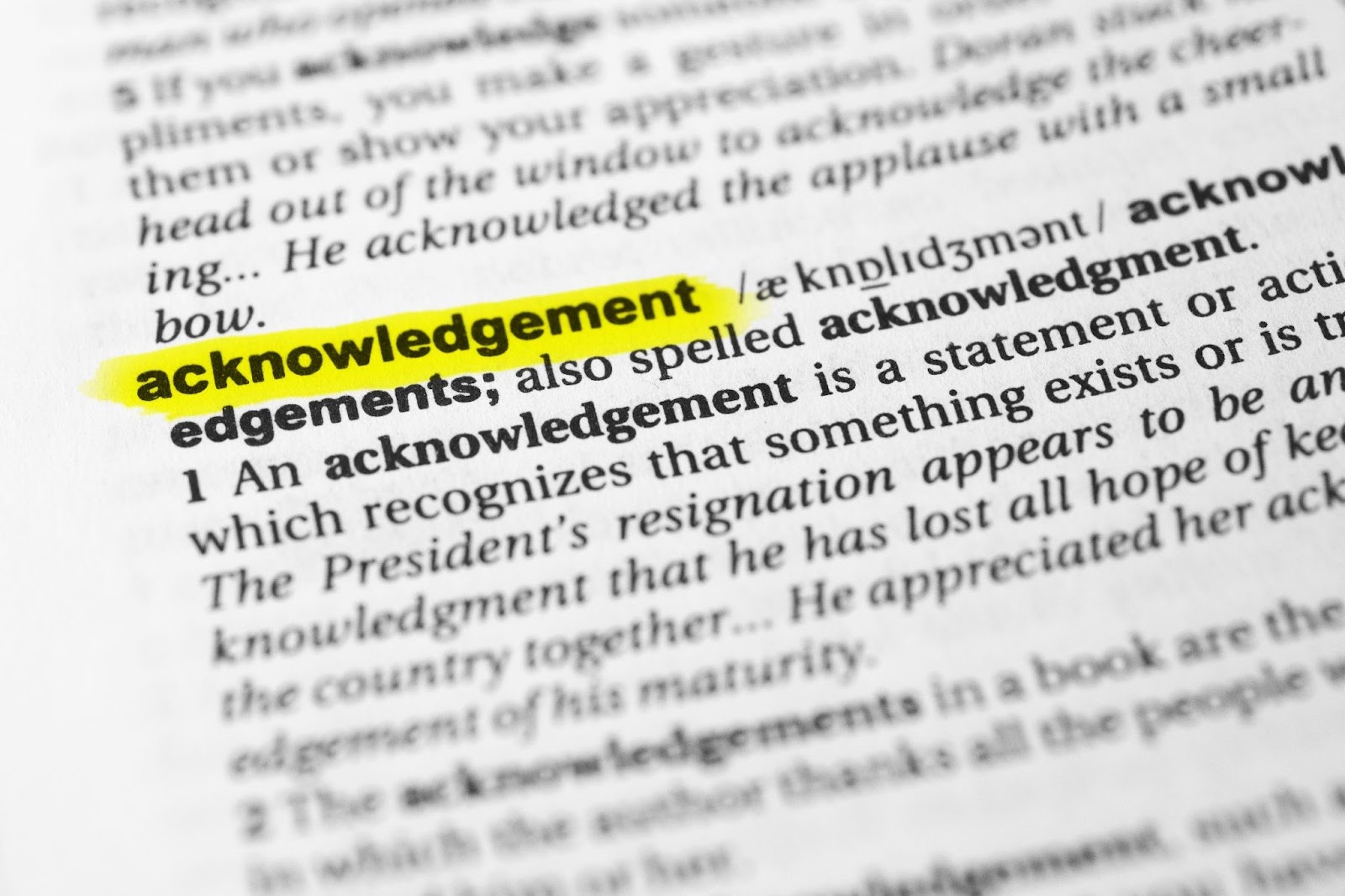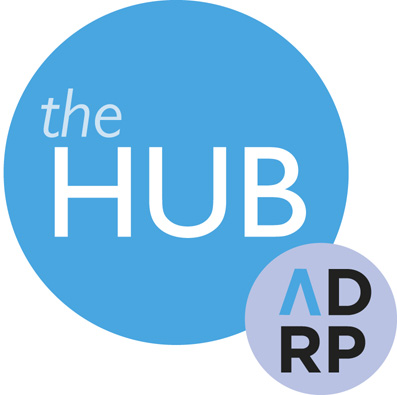- About
- Membership
- Resources
- Partner
- Events
- Awards & Scholarships
|
|
Adobe Stock | SerPhoto |
An acknowledgment letter to a donor. Acknowledging weaknesses. A land acknowledgment. Donor relations professionals use this word daily, but what are its historical and contemporary nuances? Since acknowledgment is integral to our work, I’m interested in how its different meanings and contexts might inform our thoughts on acknowledging donors and the communities our organizations serve.
A lifelong lover of words and dictionaries, my curiosity directed me first toward the Oxford English Dictionary (OED), which informs me that acknow, an Old English verb, is at the root of the modern English word “acknowledge.” Acknow’s primary meanings are:
- To know or recognize; to come to know, understand.
- To admit or show one's knowledge of something. (OED, 2021)
It’s no surprise that acknowledgment is closely linked to recognition, but I appreciate the reminder in this root word that “coming to know” is needed before we can recognize or acknowledge. In many experiences, knowing and acknowledging may blur into a single moment, but understanding is nonetheless needed before meaningful acknowledgment can happen. In philanthropic work, this prompts many questions:
-
What is it that we understand about our donors?
-
What do we recognize in their gifts to our organizations?
-
Is this understanding informed and accurate?
-
And do we reflect this knowledge in our response to their gifts?
It seems that much of the power in acknowledgment lies in those precursors to acknowledging: coming to know and understanding. The depth of understanding behind any form of acknowledgment will likely influence its impact and perceived authenticity. And, of course, many human interactions depend on authentic acknowledgment. We can acknowledge what we see in ourselves, such as love, fear, or ambition. Only by doing so can we possess self-awareness. And only by acknowledging others can we form communities.
In donor relations, we understandably focus on how we acknowledge donors. Still, since acknowledgment begins with understanding and recognizing, it's worth stepping back to consider what we affirm in our donors. Not simply what actions, but what qualities and attributes in people do we acknowledge through our work?

Photo credit: Adobe Stock | lobro
Further exploration in the OED reveals that the modern word "acknowledgment" was first noted in the 16th century and often involved a higher power, such as a deity or a ruler. By the seventeenth century, the word indicated a written token of gratitude in response to something, though not necessarily money: one might owe a friend an acknowledgment for a letter or an act of kindness.
However, financial exchange and social hierarchy often overlap in the word's history: an acknowledgment could mean a tribute paid to a lord or a sum paid by tenants upon the death of their landlord in recognition of a new landlord. Other senses that are familiar today include an admission of guilt, a confession in any sense, and a formal declaration that establishes legal validity.
Another way to acknowledge is to show that you have noticed or recognized someone through a gesture or greeting, both formal and informal: a soldier may acknowledge an officer with a salute, and friends may acknowledge one another with smiles. An acknowledgment may be as uncomplicated as a nod of the head.

Photo of Sooke Harbour as the sun goes down by Anna Morrison
Many years ago, my then-partner J and I visited Victoria, British Columbia, the traditional territory of the Lkwungen peoples. One evening, we drove along the coast to Sooke Harbour, the unceded territory of the T’Sou-ke Nation and of the neighbouring Pacheedaht and Scia’new Nations. We were headed to a particular restaurant J had read about in her pre-trip research. Just before reaching our destination, we pulled over to enjoy the harbor sunset, walking down a path that continued along the shoreline. An avid photographer, J ventured off the path in pursuit of just the right shot of the vista, the Herring Gulls, the blue silhouette of a mountain, the way the light skipped colorful stones across the surface of the water. She has an amazing eye. I hung back, enjoying the view, albeit somewhat uncomfortably—I was dressed for dinner at the restaurant, not an impromptu walk as the sun went down.
There is a phenomenon in LGBTQ+ culture known as “the nod” or “the lesbian nod.” When two lesbians or queer women who do not know each other make eye contact in passing, and one of them nods to recognize that they share an identity, this may be referred to as “the nod.” To be clear, this isn’t an up-and-down bobbing of the head; it’s more of an upward head tilt while maintaining eye contact. I knew about “the nod,” but I had not experienced it, perhaps because my gender presentation was deemed feminine or because I was shy and young. My partner had often experienced the nod, and she would sometimes tease me about how I had thus far been unable to achieve this right of passage.
As I waited for J, another couple—also women—walked by on the path. They were appropriately attired for the cooling evening and smiled at me sympathetically, correctly assessing that I was on my way to dinner with the entranced photographer. I was still standing there when this couple doubled back, and as we exchanged smiles again, one of them gave me the nod. A simple gesture, but I confess I felt instantly giddy at having been acknowledged. It changed how I perceived myself—a previously unnoticed veil fell away, and a vibrant silhouette came into focus. Some part of me became visible to myself in a different way.
~
Land acknowledgments are an increasingly familiar form of acknowledgment, recognizing the theft of land from indigenous peoples, their history of stewarding the land, and their ongoing presence and culture. Acknowledgment plays a vital role in how many indigenous peoples relate to the land itself. Karyn Recollet, an urban Cree woman and associate professor at the University of Toronto, explains: "When we talk about the newness of territorial acknowledgments, these aren't new. Acknowledging relationships to space and place is an ancient Indigenous practice that flows into the future" (Shahzad, 2017). Slow Buffalo, an ancient teacher, demonstrated a profound understanding of place in these passed-down words:
Remember . . . the ones you are going to depend upon. Up in the heavens, the Mysterious One, that is your grandfather. In between the earth and the heavens, that is your father. This earth is your grandmother. The dirt is your grandmother. Whatever grows in the earth is your mother. It is just like a sucking baby on a mother. . . .
Always remember, your grandmother is underneath your feet always. You are always on her, and your father is above. (Forbes, 2001)
Knowing the land in such familial terms rather than as property might understandably lead to a more intimate and invested sense of gratitude and stewardship.
The U.S. Department of Arts and Culture produced this video for #HonorNativeLand, an initiative to spread the practice of acknowledging Indigenous lands at the opening of public gatherings.
~
Land is an intuitive starting point for acknowledgment because it is the literal and metaphorical ground on which we see and experience everything. Systemic oppression succeeds in part by obscuring for many the ability to acknowledge the labor of oppressed peoples, inherent inequality, and historical theft. Systems of oppression work against acknowledgment: they can make it difficult for many to see what has happened historically and what is happening now. And when a person does see, especially if that person is being oppressed, they can make it dangerous to acknowledge the truth.
Beyond the recognition owed to donors, what else is there for our organizations to acknowledge? Are there debts to communities? Inequalities? Oppression historical and ongoing? These are more questions than answers—curiosity tends to propagate them—but it may be necessary to ask such questions to understand the people and places around us and affirm that knowledge.
There are many ways that DEIBJ must be realized in our organizations, communities, and philanthropy more broadly. Yet, it strikes me that donor relations professionals—for whom acknowledgment is central—are keenly positioned to do the difficult work of seeing, recognizing, and acknowledging.
Do you speak another language in which acknowledgment carries different connotations or histories? What experiences of acknowledgment in your life inform your sense of the word? Please share your thoughts and stories in My ADRP.
References
Forbes, J. D. (2001). Indigenous Americans: Spirituality and Ecos. American Academy of Arts & Sciences. Retrieved November 22, 2021, from https://www.amacad.org/publication/indigenous-americans-spirituality-and-ecos.
Oxford University Press. (2021, September). "acknow, v.". OED Online. Retrieved November 22, 2021, from http://www.oed.com/view/Entry/1605.
Oxford University Press. (2021, September). "acknowledgement | acknowledgment, n." OED Online. Retrieved November 22, 2021, from http://www.oed.com/view/Entry/1614.
Shahzad, R. (2017, July 17). Why acknowledging the indigenous lands we stand on is so important | CBC news. CBCnews. Retrieved November 22, 2021, from https://www.cbc.ca/news/canada/toronto/territorial-acknowledgements-indigenous-1.4175136.
Back to the November 2021 Hub



